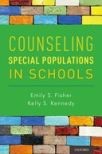 Counseling Special Populations in Schools
Counseling Special Populations in Schools
Contents
-
-
-
-
-
Overview Overview
-
Basic Considerations Basic Considerations
-
Becoming Homeless Becoming Homeless
-
Developmental, Academic, and Mental Health Needs Developmental, Academic, and Mental Health Needs
-
Homeless Youth and Schools Homeless Youth and Schools
-
The McKinney-Vento Homeless Assistance Act The McKinney-Vento Homeless Assistance Act
-
Educational Barriers and Opportunities Educational Barriers and Opportunities
-
Special Education Special Education
-
-
-
Counseling Approaches Counseling Approaches
-
Consent and Mandated Reporting Consent and Mandated Reporting
-
Counselor Characteristics Counselor Characteristics
-
Promoting Resilience Promoting Resilience
-
Where to Begin Where to Begin
-
A Resilience Framework A Resilience Framework
-
Resilience in Action: Strength-Based, Solution-Focused Brief Therapy Resilience in Action: Strength-Based, Solution-Focused Brief Therapy
-
-
Cognitive-Behavioral Therapy Cognitive-Behavioral Therapy
-
Family Involvement in Counseling Family Involvement in Counseling
-
Unaccompanied Students Unaccompanied Students
-
Accompanied Students Accompanied Students
-
-
-
Beyond the Counseling Office: Collaboration Beyond the Counseling Office: Collaboration
-
Resources Resources
-
-
-
-
-
-
-
-
-
-
-
2 Counseling Students Who Are Homeless
Get access-
Published:November 2016
Cite
Abstract
This chapter presents background information about homeless youth and suggested counseling strategies for use by school-based counselors who work with young people who are homeless. Homelessness is a growing problem for students, and students who experience homelessness are at increased risk for a host of developmental, academic, and mental health problems. Counselors working with students who are homeless must be aware of legal and ethical issues, such as the McKinney-Vento Act, which was enacted to ensure that homeless students are provided a free and appropriate public education, and mandated reporting requirements. Counselors can help promote resilience by focusing on students’ strengths and addressing issues related to stress, trauma, and family involvement. Specific counseling strategies discussed include solution-focused brief therapy and cognitive-behavioral therapy.
Sign in
Personal account
- Sign in with email/username & password
- Get email alerts
- Save searches
- Purchase content
- Activate your purchase/trial code
- Add your ORCID iD
Purchase
Our books are available by subscription or purchase to libraries and institutions.
Purchasing information| Month: | Total Views: |
|---|---|
| October 2022 | 1 |
| March 2023 | 1 |
| May 2023 | 3 |
| September 2023 | 2 |
| April 2024 | 2 |
| June 2024 | 2 |
| July 2024 | 2 |
| September 2024 | 1 |
| October 2024 | 2 |
| November 2024 | 2 |
| December 2024 | 2 |
| January 2025 | 2 |
| February 2025 | 2 |
| April 2025 | 2 |

Get help with access
Institutional access
Access to content on Oxford Academic is often provided through institutional subscriptions and purchases. If you are a member of an institution with an active account, you may be able to access content in one of the following ways:
IP based access
Typically, access is provided across an institutional network to a range of IP addresses. This authentication occurs automatically, and it is not possible to sign out of an IP authenticated account.
Sign in through your institution
Choose this option to get remote access when outside your institution. Shibboleth/Open Athens technology is used to provide single sign-on between your institution’s website and Oxford Academic.
If your institution is not listed or you cannot sign in to your institution’s website, please contact your librarian or administrator.
Sign in with a library card
Enter your library card number to sign in. If you cannot sign in, please contact your librarian.
Society Members
Society member access to a journal is achieved in one of the following ways:
Sign in through society site
Many societies offer single sign-on between the society website and Oxford Academic. If you see ‘Sign in through society site’ in the sign in pane within a journal:
If you do not have a society account or have forgotten your username or password, please contact your society.
Sign in using a personal account
Some societies use Oxford Academic personal accounts to provide access to their members. See below.
Personal account
A personal account can be used to get email alerts, save searches, purchase content, and activate subscriptions.
Some societies use Oxford Academic personal accounts to provide access to their members.
Viewing your signed in accounts
Click the account icon in the top right to:
Signed in but can't access content
Oxford Academic is home to a wide variety of products. The institutional subscription may not cover the content that you are trying to access. If you believe you should have access to that content, please contact your librarian.
Institutional account management
For librarians and administrators, your personal account also provides access to institutional account management. Here you will find options to view and activate subscriptions, manage institutional settings and access options, access usage statistics, and more.